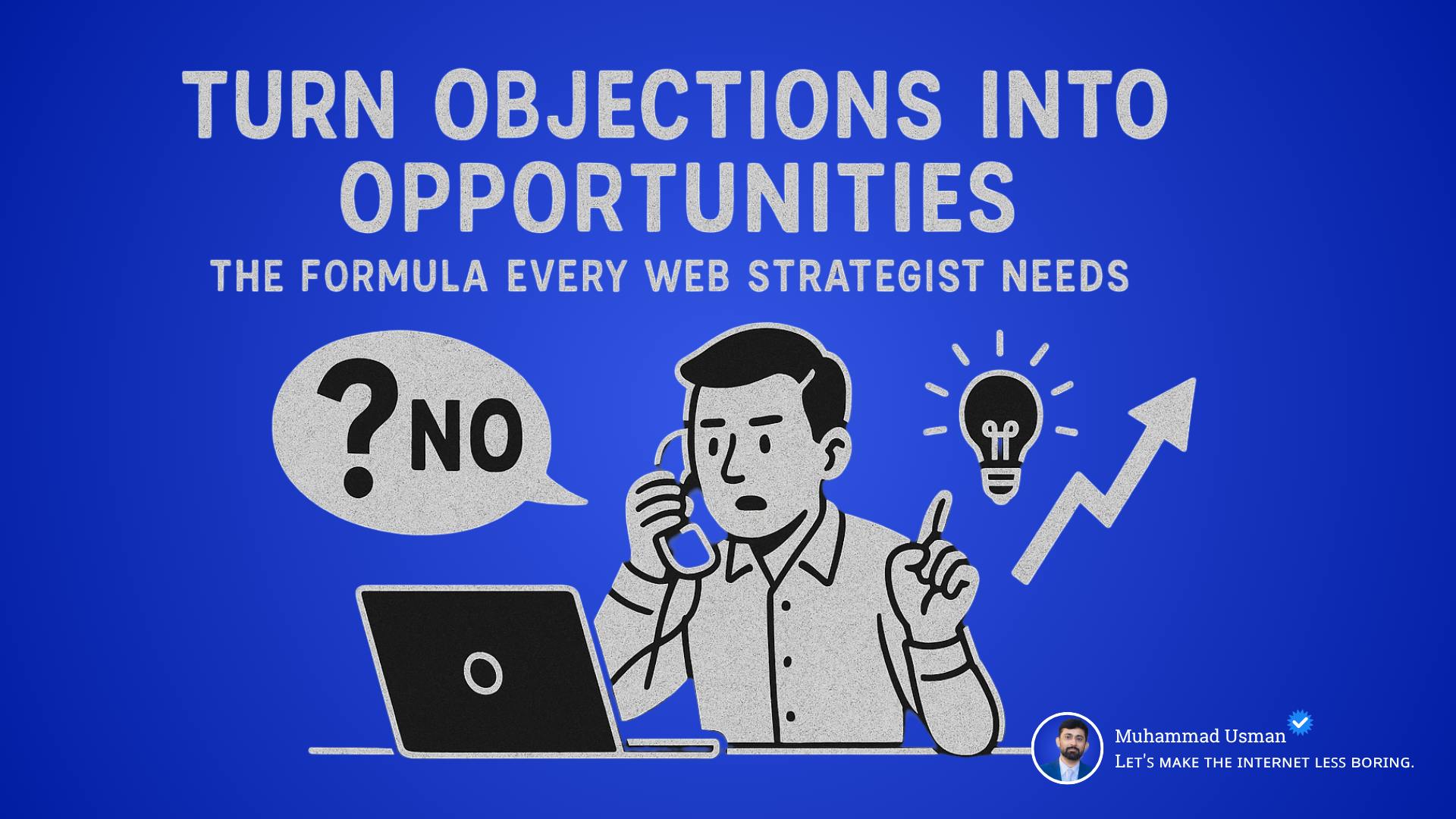Overcoming Sales Objections: 5 Smart Responses
If you’ve ever been on a sales call that didn’t go the way you hoped, you’re not alone. Web developers & designers face objections all the time, questions about price, experience, or even whether the client really needs a website at all.
In this article, I’m going to walk you through the five most common objections clients bring up and exactly how to respond to each. The goal? Help you close better deals without coming off pushy, weird, or desperate.
Before jumping in, this formula can be implemented in any professional field.
Let’s jump right in.
1: Credibility Objections: “You Don’t Seem Experienced Enough”
These usually sound like:
- “You don’t have much experience.”
- “Have you worked with anyone in my industry?”
What’s really going on here is a trust gap. The client isn’t sure if you can deliver what they need. There’s an expectation mismatch between what they want and what they think you can do.
That’s totally normal, and fixable.
What to do:
Reframe the weakness as a strength. You might say something like:
“I might be less experienced, but I’m more affordable and more motivated.” “Since I’m not stuck in your industry, I can bring a fresh perspective.”
Then, reassure them with your process. Walk them through exactly how you work, step-by-step. This gives them clarity and confidence that you’ve thought everything through and aren’t just winging it.
“Step A, Step B, Step C, here’s what it’ll look like to work with me.”
Let your process build the trust for you.
2. Price Objections: “Someone Else Can Do It Cheaper”
These might sound like:
- “I talked to someone who charges way less.”
- “Why does a WordPress site cost that much?”
- “My cousin said they’d do it for free.”
Here’s the truth: this isn’t actually about money.
It’s all about core values
People pay for expensive stuff all the time and justify it in ridiculous ways. The real problem is that the client doesn’t see the value in what you’re offering.
And that usually happens because you didn’t uncover what they value at the start of the conversation.
What to do:
Ask better questions early on. But if you get to the end of the call, and they’re still pushing back, get curious.
Ask:
“What are you hoping to get out of this project?” “What would need to happen for this to feel like a no-brainer investment?”
Then paint a picture:
“If this site helped you bring in $10,000 extra per year, would a $5,000 investment feel worth it?”
And don’t be afraid to offer perspective:
“Cheaper almost never means more valuable.” “Just having a website won’t help your business. We need strategy behind it.”
One thing you should say on almost every call:
“It doesn’t make sense for you to pay me to just build a pretty website. Let’s focus on how it’s going to grow your business.”
3. Commitment Objections: “I Need to Think About It”
What it actually meant
These show up as:
- “I want to talk it over with my partner.”
- “I’m not quite ready to start yet.”
This isn’t rejection, it’s hesitation. The danger here is losing momentum.
What to do:
Don’t push. But don’t let them ghost you either.
Protect the next step. Try to schedule the follow-up call before they hang up.
And create a little urgency, like:
“Just a heads-up, I’ve got a few projects in the pipeline. If we wait too long, your start date might get pushed back more than you’d want.”
You can also ask:
“What would make this feel more important right now?”
The key here isn’t to force a yes. It’s to make sure the conversation doesn’t end for good.
4. Scope Objections: “I Just Need Something Simple”
This is the classic:
- “I don’t need anything fancy, just a simple site.”
- “So this should be cheaper, right?”
What they’re doing is itemizing value, thinking about the project in terms of individual features instead of overall outcomes.
What to do:
Stop selling. Start educating.
Your job on the sales call is to help them understand what they’re getting and why it matters.
“You’re not just paying for features. You’re paying for results.”
When clients cut scope too much, they reduce the chances of real success. Help them see that.
5. Comparison Objections: “Why Not Hire an Agency?”
These might sound like:
- “Why shouldn’t I just go with an agency?”
- “What if you get sick or disappear?”
This is about perception. They see you as less capable, less stable.
What to do:
Same move as with credibility objections: reframe the weakness as a strength.
“Agencies can be great, but they often come with red tape and higher costs. I can offer the same value with more flexibility and personal attention.”
Then back it up with your process again.
“And if I do get sick? I’ve got systems in place to make sure you’re covered either way.”
Make it clear that you’re prepared and professional, even if you’re a solo operator.
Final Thoughts
If you’ve been getting stuck on sales calls, just know, it’s not because you’re bad at this. Objections are normal. And now you’ve got five solid responses to handle them.
To recap:
- Reframe weakness as strength
- Let your process build trust
- Ask curious, value-driven questions
- Focus on outcomes, not features
- Keep the momentum moving forward
Use these the next time a client pushes back, and keep going. You’ve got this.
See you next time.
Stay connected with me on my other platforms:















